情态动词表示推测
情态动词表示猜测

He must know my address. 他肯定知道我的地址。 He can`t know my address. 他肯定不知道我的地址。
must 对现在的猜测,must + V原形 我一定是疯了才会说出那些话! I must be crazy for saying those words!
在否定句中,可用于猜测的情态动词有: may/might not, can/ could not 否定语气不肯定时,可用may/might not, 可能不 That means the customers may/might not be respected. 这意味着顾客可能不被尊重。 现在她可能不会在等你。 She may/might not be waiting for you now. 否定语气较强时,则用can/could not, 一定不 树下的那个人肯定不是Mary的男友。 The man under the tree couldn't be Mary's BF. 在疑问句中,可用于猜测的情态动词只有can/could,不可 用may/might How could you be so rude? What can he mean?
对已经完成的动作的猜测,“可能已经” may/ might/ could have done 那些学生可能之前已经看过那部电影了。 Those students may/ might/ could have seen that film before. e.g. --I've taken someone else's green sweater by mistake. --It ___ Harry's. He aways wears green. A. has to be B. may be C. mustn't be D. would be
情态动词表示推测的用法
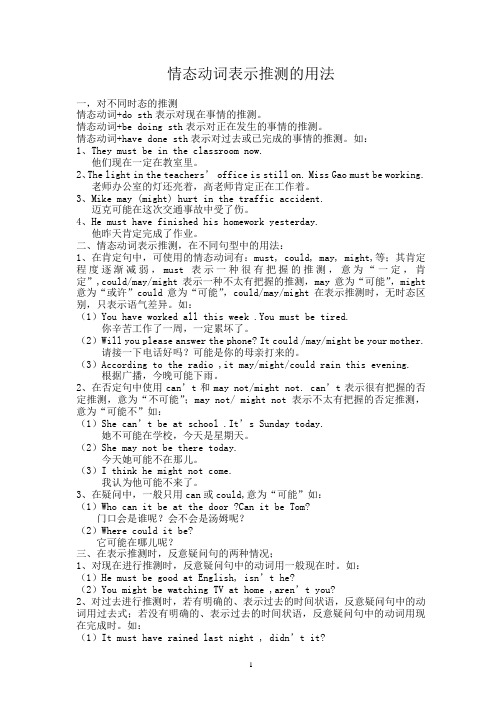
情态动词表示推测的用法一,对不同时态的推测情态动词+do sth表示对现在事情的推测。
情态动词+be doing sth表示对正在发生的事情的推测。
情态动词+have done sth表示对过去或已完成的事情的推测。
如:1、They must be in the classroom now.他们现在一定在教室里。
2、The light in the teachers’office is still on. Miss Gao must be working.老师办公室的灯还亮着,高老师肯定正在工作着。
3、Mike may (might) hurt in the traffic accident.迈克可能在这次交通事故中受了伤。
4、He must have finished his homework yesterday.他昨天肯定完成了作业。
二、情态动词表示推测,在不同句型中的用法:1、在肯定句中,可使用的情态动词有:must, could, may, might,等;其肯定程度逐渐减弱,must表示一种很有把握的推测,意为“一定,肯定”,could/may/might表示一种不太有把握的推测,may意为“可能”,might 意为“或许”could意为“可能”,could/may/might在表示推测时,无时态区别,只表示语气差异。
如:(1)You have worked all this week .You must be tired.你辛苦工作了一周,一定累坏了。
(2)Will you please answer the phone? It could /may/might be your mother.请接一下电话好吗?可能是你的母亲打来的。
(3)According to the radio ,it may/might/could rain this evening.根据广播,今晚可能下雨。
2、在否定句中使用can’t和may not/might not. can’t表示很有把握的否定推测,意为“不可能”;may not/ might not 表示不太有把握的否定推测,意为“可能不”如:(1)She can’t be at school .It’s Sunday today.她不可能在学校,今天是星期天。
情态动词表示推测
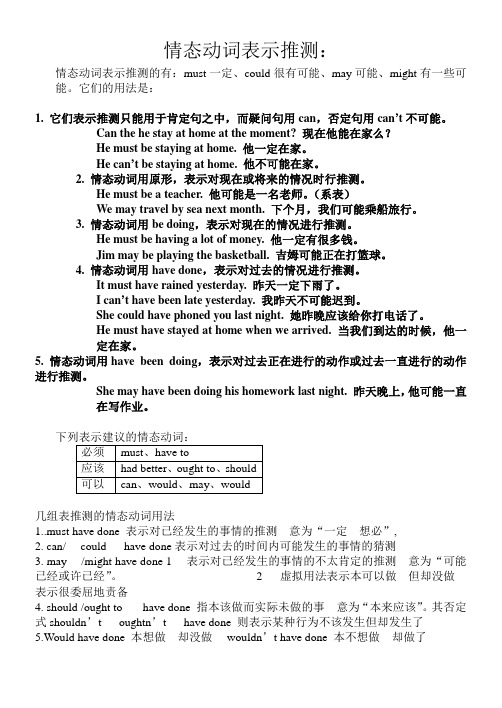
情态动词表示推测:情态动词表示推测的有:must一定、could很有可能、may可能、might有一些可能。
它们的用法是:1. 它们表示推测只能用于肯定句之中,而疑问句用can,否定句用can’t不可能。
Can the he stay at home at the moment? 现在他能在家么?He must be staying at home. 他一定在家。
He can’t be staying at home. 他不可能在家。
2. 情态动词用原形,表示对现在或将来的情况时行推测。
He must be a teacher. 他可能是一名老师。
(系表)We may travel by sea next month. 下个月,我们可能乘船旅行。
3. 情态动词用be doing,表示对现在的情况进行推测。
He must be having a lot of money. 他一定有很多钱。
Jim may be playing the basketball. 吉姆可能正在打篮球。
4. 情态动词用have done,表示对过去的情况进行推测。
It must have rained yesterday. 昨天一定下雨了。
I can’t have been late yesterday. 我昨天不可能迟到。
She could have phoned you last night. 她昨晚应该给你打电话了。
He must have stayed at home when we arrived. 当我们到达的时候,他一定在家。
5. 情态动词用have been doing,表示对过去正在进行的动作或过去一直进行的动作进行推测。
She may have been doing his homework last night. 昨天晚上,他可能一直在写作业。
几组表推测的情态动词用法1..must have done 表示对已经发生的事情的推测 意为“一定 想必”,2. can/ could have done表示对过去的时间内可能发生的事情的猜测3. may /might have done 1 表示对已经发生的事情的不太肯定的推测 意为“可能已经或许已经”。
情态动词表示推测
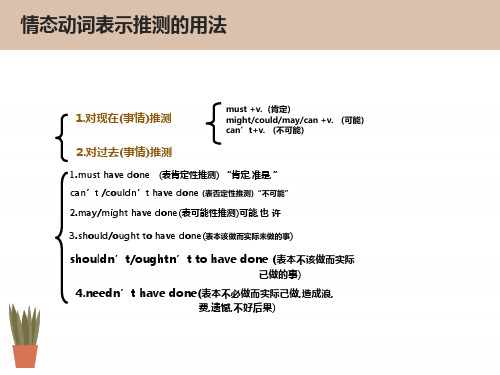
must have done (表肯定性推测) “肯定,准是,” can’t /couldn’t have done (表否定性推测)“不可能” It must have rained last night,for the road is wet.(It can’t/couldn’t have rained last night.)
Ten passangers were in a car!It can’t have been a comfortable jurnery.
(可能性大)
4.He may have gone to Beijing yesterday.
(可能性小)
5He might have gone to Beijing yesterday.
01
There was plenty of time.She needn’t have hurried.
02
You shoulห้องสมุดไป่ตู้ have come to the meeting.
--- He must be Mr. Li.(肯定是)
--No,he can’t be Mr. Li. Mr.Li has
gone to Britain.(不可能是)
We may be late for class.It’s already seven to five.(也许)
You mustn’t play with fire!
另外,在虚拟语气中还有:
02
would have done… 表示“本来会…..”
但实际上并没有发生
情态动词表示推测的用法
1.对现在(事情)推测
2.对过去(事情)推测
情态动词表示“推测”的用法

情态动词表示“推测”的用法英语中,情态动词can / could, may / might, must / can, would / should 等都可以表示“推测”。
具体用法如下:1. can 和couldcan 表示推测时,可能性比较大,用于疑问句或否定句中,不用于肯定句中,意思是“不可能”。
表示一种有把握的推测。
表示否定时,can’t语气最强。
如:It can’t be Mr Li. He has gone to Nanjing already.They can’t know the answer. Let me explain it to them.That can’t be her husband. She is still single.could 表示推测时,可以用于否定句,也可以用在后面跟不定式一般式的肯定句。
表示可能性不大的推测。
意思相当于may / might。
如:Anything could happen if you do not obey the rule.It could be true. But I still doubt it.2. may和mightmay / might 表示一种“可能性很小”的推测。
多用在肯定句或否定句中,might 用在疑问句中表示“可能”,语气最弱。
如:My English teacher may be correcting our exercises in her office.My sister may not be in her room at this moment.The scientists might be discussing the pollution problem.3. must 和can在表示推测的情态动词中,must 的把握最大,意思为“一定,肯定”。
表示对一般情况的推测。
如:Your sister must be a doctor, isn’t she?The boys must be playing football on the playground, aren’t they?Li Ping must be punished by his father.(以上几句要注意其反意疑问句的构成)can的推测用法:在肯定句中can 可以表示客观的(理论的)可能性,并不涉及具体某事是否会发生,此用法常常可以说明人或事物的特征。
解析情态动词表推测

解析情态动词表推测情态动词表推测的三种时态如下:1、对将来情况的推测,用“情态动词+动词原形”。
(1)She must / may / might / could arrive before 5.5:00前她一定/可能/也许到。
2、对现在或一般情况的推测,用“情态动词+be”,“情态动词+be doing”或“情态动词+动词原形”。
(1)He must/may/might/could be listening to the radio now.他一定/可能/也许正在听收音机。
(2)He can't(couldn't)/may(might) not be at home at this time.这个时候他不可能/可能不在家。
3、对过去情况的推测,用“情态动词+ have +过去分词”。
It must/may/might/could have rained last night.The ground is wet.地湿了,昨晚肯定/可能/也许下雨了。
情态动词表推测可能性大小的排列情态动词有must,can/could may/might,can't/couldn't。
表示推测的情态动词有must,can,could,may,might 等,且语气由左向右依次减弱。
could,might并不一定是can,may的过去式,有时只是语气分别比can,may更弱。
常见的表示推测的情态动词:must, could, may, might, may not, can’t1) 表示肯定推测时,可能性:must一定>could 可能>may也许>migh也许,表示对现在发生的事的推测例如:It is 9:00 p.m. She must be at home. 晚上九点了。
她现在一定在家。
注意:must只用于肯定句如果表示“一定不”,用can’t:She can’t be at home. 她一定不在家。
表推测的情态动词及其用法
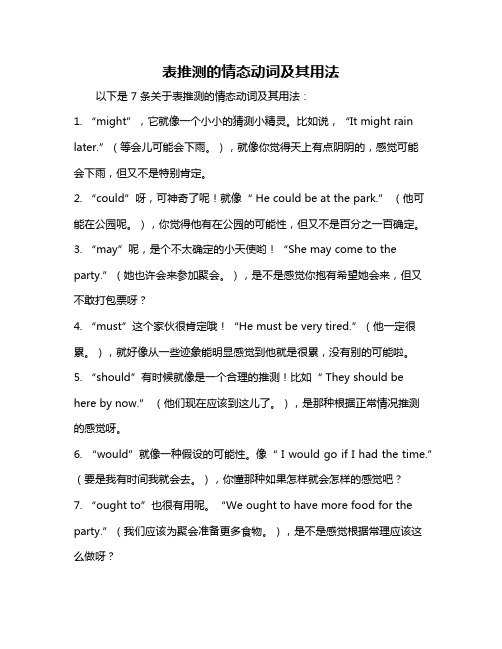
表推测的情态动词及其用法以下是 7 条关于表推测的情态动词及其用法:1. “might”,它就像一个小小的猜测小精灵。
比如说,“It might rain later.”(等会儿可能会下雨。
),就像你觉得天上有点阴阴的,感觉可能会下雨,但又不是特别肯定。
2. “could”呀,可神奇了呢!就像“ He could be at the park.” (他可能在公园呢。
),你觉得他有在公园的可能性,但又不是百分之一百确定。
3. “may”呢,是个不太确定的小天使哟!“She may come to the party.”(她也许会来参加聚会。
),是不是感觉你抱有希望她会来,但又不敢打包票呀?4. “must”这个家伙很肯定哦!“He must be very tired.”(他一定很累。
),就好像从一些迹象能明显感觉到他就是很累,没有别的可能啦。
5. “should”有时候就像是一个合理的推测!比如“ They should behere by now.” (他们现在应该到这儿了。
),是那种根据正常情况推测的感觉呀。
6. “would”就像一种假设的可能性。
像“ I would go if I had the time.” (要是我有时间我就会去。
),你懂那种如果怎样就会怎样的感觉吧?7. “ought to”也很有用呢。
“We ought to have more food for the party.”(我们应该为聚会准备更多食物。
),是不是感觉根据常理应该这么做呀?我觉得啊,这些情态动词让我们的表达更丰富、更灵活,能更好地传达我们心中那种不确定或者推测的感觉,真是太奇妙啦!。
表示“推测”的情态动词
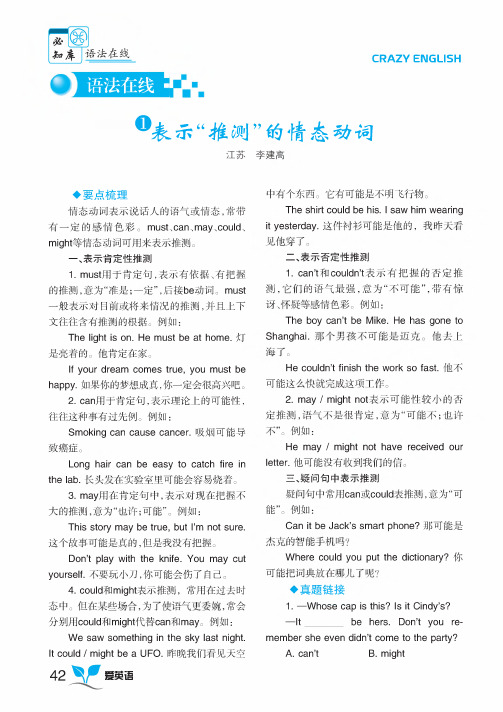
CRAZY ENGLISH❶表示“推测"的情态动词江苏李建咼♦要点梳理情态动词表示说话人的语气或情态.常带有一定的感情色彩。
must、can、may、could、might等情态动词可用来表示推测。
一、表示肯定性推测1.must用于肯定句,表示有依据、有把握的推测,意为"准是;一定",后接be动词。
must 一般表示对目前或将来情况的推测,并且上下文往往含有推测的根据。
例如:The light is on.He must be at home.灯 是亮着的。
他肯定在家。
If your dream comes true,you must be happy.如果你的梦想成真,你一定会很高兴吧。
2.can用于肯定句,表示理论上的可能性,往往这种事有过先例。
例如:Smoking can cause cancer.吸烟可能导致癌症。
Long hair can be easy to catch fire in the lab.在实验室里可能会容易烧着。
3.may用在肯定句中,表示对现在把握不大的推测,意为H;可能”。
例如:This story may be true,but I'm not sure.这个故事可能是真的,但是我没有把握。
Don't play with the knife.You may cut yourself.要玩小刀,你可能会伤了自己。
4.could和might表示推测,常用在过去时态中。
但在,为语气,常会分另U用could和might代替can和may。
例如:We saw something in the sky last night. It could/might be a UFO.昨晚我们看见天空中有个东西。
它有可能是不明飞行物。
The shirt could be his.I saw him wearing it yesterday.这可能是他的,我他。
情态动词表推测
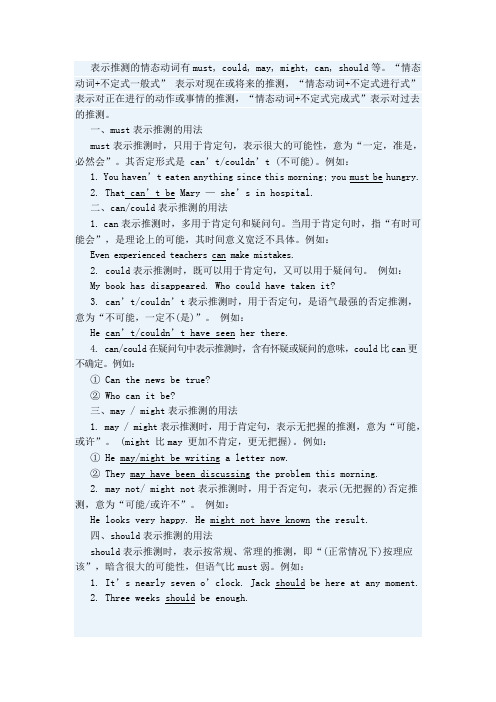
表示推测的情态动词有must, could, may, might, can, should等。
“情态动词+不定式一般式” 表示对现在或将来的推测,“情态动词+不定式进行式”表示对正在进行的动作或事情的推测,“情态动词+不定式完成式”表示对过去的推测。
一、must表示推测的用法must表示推测时,只用于肯定句,表示很大的可能性,意为“一定,准是,必然会”。
其否定形式是can’t/couldn’t (不可能)。
例如:1. You haven’t eaten anything since this m orning; you must be hungry.2. That can’t be Mary —she’s in hospital.二、can/could表示推测的用法1. can表示推测时,多用于肯定句和疑问句。
当用于肯定句时,指“有时可能会”,是理论上的可能,其时间意义宽泛不具体。
例如:Even experienced teachers can make mistakes.2. could表示推测时,既可以用于肯定句,又可以用于疑问句。
例如:My book has disappeared. Who could have taken it?3. can’t/couldn’t表示推测时,用于否定句,是语气最强的否定推测,意为“不可能,一定不(是)”。
例如:He can’t/couldn’t have seen her there.4. can/could在疑问句中表示推测时,含有怀疑或疑问的意味,could比can更不确定。
例如:① Can the news be true?② Who can it be?三、may / might表示推测的用法1. may / might表示推测时,用于肯定句,表示无把握的推测,意为“可能,或许”。
(might 比may 更加不肯定,更无把握)。
例如:① He may/might be writing a letter now.② They may have been discussing the problem this morning.2. may not/ might not表示推测时,用于否定句,表示(无把握的)否定推测,意为“可能/或许不”。
表示推测的情态动词
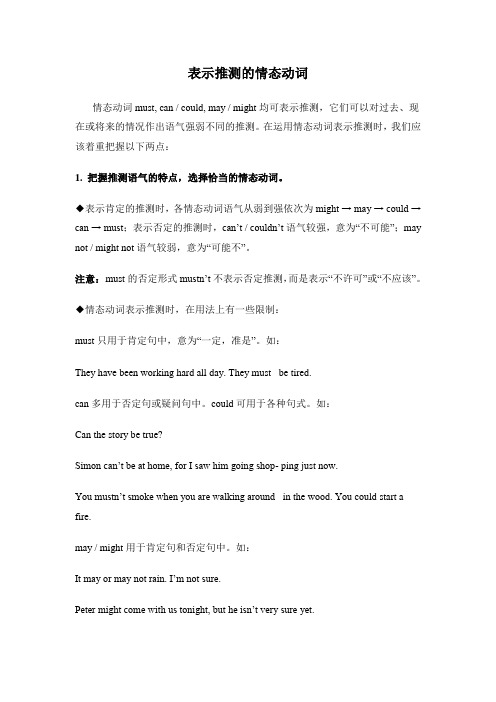
表示推测的情态动词情态动词must, can / could, may / might均可表示推测,它们可以对过去、现在或将来的情况作出语气强弱不同的推测。
在运用情态动词表示推测时,我们应该着重把握以下两点:1. 把握推测语气的特点,选择恰当的情态动词。
◆表示肯定的推测时,各情态动词语气从弱到强依次为might → may → could → can → must;表示否定的推测时,can’t / couldn’t语气较强,意为“不可能”;may not / might not语气较弱,意为“可能不”。
注意:must的否定形式mustn’t不表示否定推测,而是表示“不许可”或“不应该”。
◆情态动词表示推测时,在用法上有一些限制:must只用于肯定句中,意为“一定,准是”。
如:They have been working hard all day. They must be tired.can多用于否定句或疑问句中。
could可用于各种句式。
如:Can the story be true?Simon can’t be at home, for I saw him going shop- ping just now.You mustn’t smoke when you are walking around in the wood. You could start a fire.may / might用于肯定句和否定句中。
如:It may or may not rain. I’m not sure.Peter might come with us tonight, but he isn’t very sure yet.2. 确定被推测时间,正确判断动词时态。
◆对现在或将来的情况进行推测时,用“情态动词+ do”。
如:Mr. Reed looks pale. He may be ill.If you don’t have a guide, you could lose your way.◆对此时此刻正在进行的情况进行推测时,用“情态动词+ be +动词-ing形式”。
表推测的情态动词

3. “can/could not +have +done”“过 去 不可能做了某事” 她不能去你家,她不知道你的地址。 eg. She can not have been to your house;she does not know your address.
4. may/might have done“过去或许做 过某事” may/might not have done “过去或 许 没有做过某事” eg. I can’t find my key, I might have left it at home. He might not have got your letter.
二.“情态动词+have done” 的用法。 1.must have done “过去一定做了某事” 表示对过去的一种肯定性推测。 eg. She must have gone by bus. It must have rained last night, for the road is quite muddy.
2. can/could have+done“过去可能 做了某事”, “could have+done”也可表示‘‘过 去本可以做某事但实际上却没有做” eg. He was not at home last night, he could have gone to the cinema. I could have finished my homework last night, but I was too sleepy.
5.ought to/should have done,”表示本应该 做某事,而事实上并没有做”。 否定句表示“ 本不该做某事而实际上做 了”。 你在实验中本应该更仔细些的 You ought to/should have been more careful in this experiment. 他不应该把那些旧衣服扔了。 He ought not to have thrown the old clothes away.
情态动词表推测的五种情况
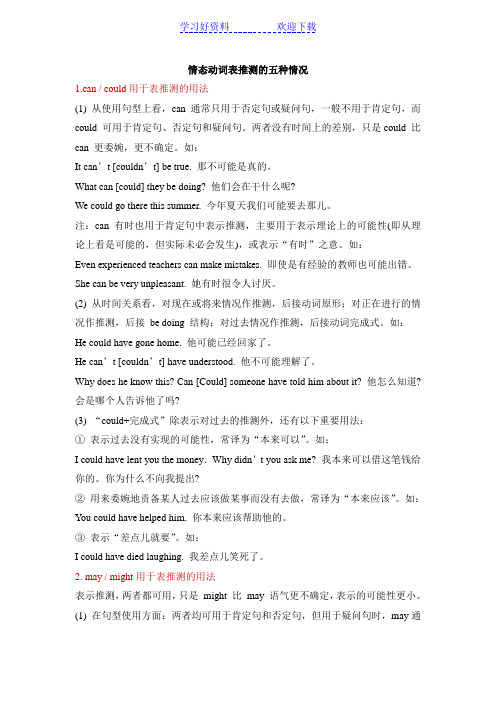
情态动词表推测的五种情况1.can / could用于表推测的用法(1) 从使用句型上看,can 通常只用于否定句或疑问句,一般不用于肯定句,而could 可用于肯定句、否定句和疑问句。
两者没有时间上的差别,只是could 比can 更委婉,更不确定。
如:It can’t [couldn’t] be true. 那不可能是真的。
What can [could] they be doing? 他们会在干什么呢?We could go there this summer. 今年夏天我们可能要去那儿。
注:can 有时也用于肯定句中表示推测,主要用于表示理论上的可能性(即从理论上看是可能的,但实际未必会发生),或表示“有时”之意。
如:Even experienced teachers can make mistakes. 即使是有经验的教师也可能出错。
She can be very unpleasant. 她有时很令人讨厌。
(2) 从时间关系看,对现在或将来情况作推测,后接动词原形;对正在进行的情况作推测,后接be doing 结构;对过去情况作推测,后接动词完成式。
如:He could have gone home. 他可能已经回家了。
He can’t [couldn’t] have understood. 他不可能理解了。
Why does he know this? Can [Could] someone have told him about it? 他怎么知道? 会是哪个人告诉他了吗?(3) “could+完成式”除表示对过去的推测外,还有以下重要用法:①表示过去没有实现的可能性,常译为“本来可以”。
如:I could have lent you the money.Why didn’t you ask me? 我本来可以借这笔钱给你的。
你为什么不向我提出?②用来委婉地责备某人过去应该做某事而没有去做,常译为“本来应该”。
情态动词表推测例句

情态动词表推测例句1. 他今天没来上班,说不定被外星人绑架了呢,那外星人可能看他长得像个圆滚滚的土豆,就想带回去研究研究。
2. 小李这么久没回消息,也许他掉进了一个全是棉花糖的大坑里,正忙着吃棉花糖没空看手机呢,他可能觉得那棉花糖像云朵一样美味。
3. 我刚看到那只猫走路一瘸一拐的,它大概是和老鼠打架的时候被老鼠揍了,那老鼠没准像个武林高手,把猫打得毫无还手之力。
4. 老王今天穿得这么正式,他也许是要去参加国王的宴会呢,他可能觉得自己是城堡里最帅的骑士,虽然他长得像个冬瓜。
5. 这蛋糕怎么少了一块,说不定是家里的小精灵偷吃了,那小精灵可能像个小馋虫,看到蛋糕就走不动道。
6. 我的笔不见了,它可能是被文具王国的小贼偷走了,那小贼也许看我的笔像个闪闪发光的魔法棒。
7. 小张上课一直打瞌睡,他大概是昨晚被一群蚊子吵得没睡好,那些蚊子没准像一群轰炸机在他耳边嗡嗡叫。
8. 这棵树的叶子怎么都黄了,也许是它听了太多悲伤的故事,就像人听多了会哭一样,它可能是树界的林黛玉。
9. 小赵跑得那么快,他说不定是被后面有只像恐龙那么大的狗在追,所以才拼命狂奔。
10. 那朵花一直不开,它可能是在等一个像白马王子一样的蜜蜂来亲吻它,才肯绽放呢。
11. 我闻到一股怪味,这屋里也许有个像臭豆腐精一样的小妖怪在捣乱。
12. 他头发乱得像个鸟窝,可能是被一阵像龙卷风一样的大风吹过。
13. 这个手机突然死机了,说不定是它被手机病毒入侵了,那病毒可能像个小恶魔在里面搞破坏。
14. 那只鸟一直在窗前叫,它大概是想告诉我有宝藏,它可能觉得我像个大冒险家。
15. 我的鞋怎么破了个洞,也许是被一只像剪刀一样锋利的小螃蟹夹破的。
16. 他笑得那么大声,可能是听到了一个像原子弹爆炸一样搞笑的笑话。
17. 这个房子看起来阴森森的,里面也许住着像幽灵一样的东西,它可能像个黑影在房子里飘来飘去。
18. 那片云的形状好奇怪,它可能是被一个像超级艺术家一样的神仙捏成这样的。
情态动词表推测
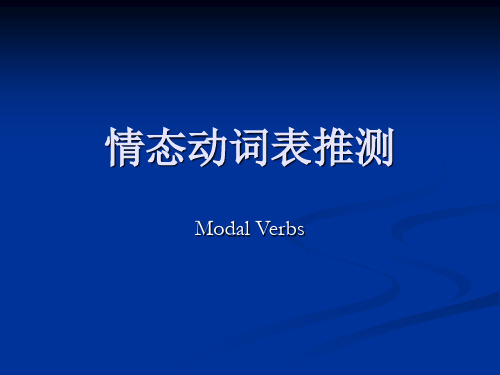
______ be at home. can’t 4. --Is this Lan Qiang’s boxing glove? --Is --Yes, it must be his. This’s his name on the back. --Yes, ____ may/might/could 5. You’d better take an umbrella. It ______________ rain this afternoon. must 6. It’s the library! So you ____ know shouting is not allowed here. 7. --Have you decided where to spend your summer --Have holiay? ma --Not yet. We ____ go to Qingdao. --Not y us a speech this evening? 8. --Is Jessica giving --Is --No, it can’t be her. She has been to Japan. --No, ____
9. --What will the weather be like tomorrow? --What --It _____ be rainy, cloudy or sunny. Who knows? --It might must 10. You _____ be tired after playing sports for a long time without a rest. 11. --Can I tell Peter about the news? --Can --No, I don’t want anyone else to know it. You --No, don’ must ____ keep it to yourself. 12. --Marry, I have cleaned the room for you. --Marry, --Thank you. Youneedn’t have --Thank ______________ it. I could manage it myself. done
- 1、下载文档前请自行甄别文档内容的完整性,平台不提供额外的编辑、内容补充、找答案等附加服务。
- 2、"仅部分预览"的文档,不可在线预览部分如存在完整性等问题,可反馈申请退款(可完整预览的文档不适用该条件!)。
- 3、如文档侵犯您的权益,请联系客服反馈,我们会尽快为您处理(人工客服工作时间:9:00-18:30)。
2.may/might have done(表可能性推测)可能,也 许
3.should/ought to have done(表本该做而实际未做的事
dn’t/oughtn’t to have done (表本不该做而实际
已做的事)
4.needn’t have done(表本不必做而实际己做,造成浪,
费,遗憾,不好后果)
情态动词表示推测的用法
1.对现在(事情)推测: must + v. (肯定)
may/might/could/can+v. (可能)
(情态动词+ 动词原形) can’t + v. (不可能)
2.对过去(事情)推测:(情态动词+ 完成式)
must have done (表肯定性推测) “肯定,准是,” can’t /couldn’t have done (表否定性推测)“不可能”
情态动词表示推测的用法
1.对现在(事情)推测 2.对过去(事情)推测
must +v. (肯定) might/could/may/can +v. (可能) can’t+v. (不可能)
1.must have done (表肯定性推测) “肯定,准是,”
can’t /couldn’t have done (表否定性推测)“不可能”
gone to Britain.(不可能是) 2.We may be late for class.It’s already
seven to five.(也许) 3.You mustn’t play with fire!
另外,在虚拟语气中还有:
would have done… 表示“本来会….. ”
hasn’t she? 3.She must have gone to Shanghai
yesterday, didn’t she?
特殊疑问句 疑问词+do you
(插入语)
Think suggest believe imagine suppose say
+主语+谓语
2.---Can it have been a comfortable journey?
3.Ten passangers were in a car!It can’t have been a comfortable jurnery.
4.He may have gone to Beijing yesterday. (可能性大)
It must have rained last night,for the road is wet.(It can’t/couldn’t have rained last night.)
1.It must have rained last night.for the ditch(水道,渠道) is full of water.
You should hav但e 实co际me上e并arl没ier有, o发th生erwise you would have met him.
你本该早点来,否则的话,你就会遇见 他.(实际上没有早来,也没见到他)
must表推测的反意疑问句: 反意问句部分永远不带must.
1.She must be a teacher,isn’t she? 2.She must have gone to Shanghai,
5He might have gone to Beijing yesterday. (可能性小)
6.There was plenty of time.She needn’t have hurried.
7 You should have come to the meeting.
1.--- He must be Mr. Li.(肯定是) ---No,he can’t be Mr. Li. Mr.Li has
